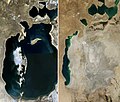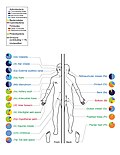Human ecosystems are human-dominated ecosystems of the anthropocene era that are viewed as complex cybernetic systems by conceptual models that are increasingly...
3 KB (260 words) - 00:11, 19 December 2023
Total human ecosystem (THE) is an ecocentric concept initially proposed by ecology professors Zeev Naveh and Arthur S. Lieberman in 1994. Naveh and Lieberman...
5 KB (630 words) - 09:51, 18 May 2025
An ecosystem (or ecological system) is a system formed by organisms in interaction with their environment.: 458 The biotic and abiotic components are...
64 KB (6,962 words) - 09:19, 1 June 2025
Novel ecosystems are human-built, modified, or engineered niches of the Anthropocene. They exist in places that have been altered in structure and function...
22 KB (2,206 words) - 06:24, 6 April 2025
An ecosystem, short for ecological system, is defined as a collection of interacting organisms within a biophysical environment.: 458 Ecosystems are never...
41 KB (5,011 words) - 17:14, 30 May 2025
researchers calculated that more than 10,000 microbial species occupy the human ecosystem, and they have identified 81–99% of the genera. The statistical analysis...
108 KB (11,991 words) - 12:32, 23 May 2025
ecosystems rely on large subsidies of imported water, nutrients, food and other resources. Compared to other natural and artificial ecosystems human population...
20 KB (2,353 words) - 18:22, 23 May 2025
Ecosystem services are the various benefits that humans derive from ecosystems. The interconnected living and non-living components of the natural environment...
61 KB (6,905 words) - 14:57, 25 March 2025
Marine ecosystems are the largest of Earth's aquatic ecosystems and exist in waters that have a high salt content. These systems contrast with freshwater...
45 KB (6,033 words) - 13:39, 25 May 2025
Nature (section Ecosystems)
between themselves as well as with their environment. The human ecosystem concept is based on the human/nature dichotomy and the idea that all species are ecologically...
90 KB (9,641 words) - 06:20, 3 June 2025
contemporary ecosystems have been influenced by human action.[1] Human ecology has been defined as a type of analysis applied to the relations in human beings...
68 KB (7,440 words) - 20:55, 21 April 2025
aquatic ecosystem is an ecosystem found in and around a body of water, in contrast to land-based terrestrial ecosystems. Aquatic ecosystems contain communities...
15 KB (2,834 words) - 16:21, 23 April 2025
decomposition, and trophic interactions. Studies of ecosystem function have greatly improved human understanding of sustainable production of forage, fiber...
29 KB (3,622 words) - 11:43, 25 May 2025
Ecosystem diversity deals with the variations in ecosystems within a geographical location and its overall impact on human existence and the environment...
12 KB (1,267 words) - 08:27, 25 May 2025
life-support system for the human brain linked to a robot, between 2030 and 2035 creating a computer model of the brain and human consciousness with the means...
8 KB (744 words) - 16:23, 10 May 2025
Cyborg (redirect from Robots with human brains)
intelligence. A related idea is the "augmented human". While cyborgs are commonly thought of as mammals, including humans, the term can apply to any organism. D...
102 KB (11,465 words) - 17:00, 23 May 2025
in the 1990s from a growing appreciation of the complexity of ecosystems and of humans' reliance and influence on natural systems (e.g., disturbance and...
45 KB (4,735 words) - 22:05, 22 May 2025
A lake ecosystem or lacustrine ecosystem includes biotic (living) plants, animals and micro-organisms, as well as abiotic (non-living) physical and chemical...
41 KB (5,307 words) - 21:46, 23 May 2025
The Millennium Ecosystem Assessment (MA) is a major assessment of the human impact on the environment, called for by the United Nations Secretary-General...
6 KB (727 words) - 09:52, 8 December 2024
change. They all involve the management of ecosystems and their services to reduce the vulnerability of human communities to the impacts of climate change...
23 KB (2,493 words) - 17:58, 29 April 2024
Natural environment (section Ecosystems)
parts) within the system is an ecosystem." The human ecosystem concept is then grounded in the deconstruction of the human/nature dichotomy, and the emergent...
54 KB (5,668 words) - 08:46, 15 May 2025
benchmark for restoration." Reference ecosystems usually include remnant natural areas that have not been degraded by human activities such as agriculture,...
2 KB (177 words) - 18:26, 16 November 2023
Apex predator (section Effects on ecosystem)
effects on lower levels of an ecosystem are termed trophic cascades. The removal of top-level predators, often through human agency, can cause or disrupt...
34 KB (3,273 words) - 20:56, 9 April 2025
Ecosystem health is a metaphor used to describe the condition of an ecosystem. Ecosystem condition can vary as a result of fire, flooding, drought, extinctions...
49 KB (5,356 words) - 23:32, 20 May 2025
include non-human elements. Civic monuments, then, should honor and celebrate the life and acts of the total community, the human ecosystem, including...
5 KB (636 words) - 19:47, 22 September 2024
An ecosystem engineer is any species that creates, significantly modifies, maintains or destroys a habitat. These organisms can have a large impact on...
27 KB (2,933 words) - 21:28, 22 May 2025
Intelligence amplification (redirect from Augmenting Human Intellect)
enhanced intelligence) is the use of information technology in augmenting human intelligence. The idea was first proposed in the 1950s and 1960s by cybernetics...
21 KB (2,410 words) - 09:15, 25 May 2025
Ecology (redirect from Ecosystem science)
Biodiversity plays an important role in ecosystem services which by definition maintain and improve human quality of life. Conservation priorities and...
210 KB (21,580 words) - 13:02, 31 May 2025
Ampère to denote the sciences of government in his classification system of human knowledge. According to Norbert Wiener, the word cybernetics was coined...
39 KB (4,388 words) - 20:46, 17 March 2025
characteristics of the ecosystems. Original attempts to understand and monitor freshwater ecosystems were spurred on by threats to human health (for example...
18 KB (2,913 words) - 14:56, 26 May 2025





















